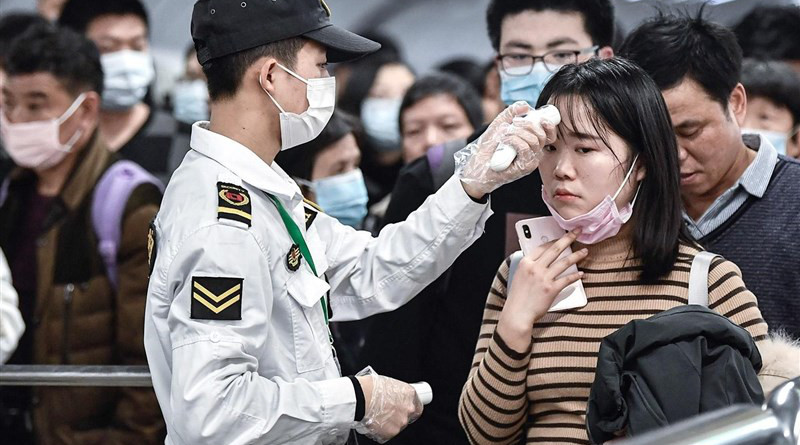The Chinese Model Is Under Stress – Analysis
By Observer Research Foundation
By Harsh V. Pant
What started in Wuhan is now a global epidemic. The WHO is suggesting that though it might be too early to call the outbreak a pandemic but countries should be “in a phase of preparedness.” The death toll continues to mount in China which stands above 2600 – with almost 77,000 infections in total. More than 1,200 cases in about 30 other countries have been confirmed with Iran and Italy emerging as hotspots in recent days. Several cruise ships remain stranded at sea as ports are wary of passengers bringing in coronavirus. Global travel and global economic health is getting impacted with every passing day. The pressure on the Chinese Communist Party (CCP) is clearly mounting.
Donning a face mask and calling for more “decisive” measures to tackle the deadly coronavirus outbreak, the Chinese President Xi Jinping got his temperature checked in a visit to a hospital earlier this month. After being largely out of the public view since the outbreak and deputing Premier Li Keqiang to do most of the legwork, Xi has been forced to shift gears in his response in recent days. This is now becoming one of the most serious threats to emerge for ordinary Chinese as well as the CCP and Xi as the toll has overtaken global fatalities in the 2002-03 Severe Acute Respiratory Syndrome or SARS epidemic when China faced global ire for covering up cases.
Not surprisingly, the Chinese government has had to respond in an unprecedented manner by locking down entire cities in Hubei, cutting transport links nationwide, closing tourist attractions as well as pushing hundreds of millions of people indoors. Major cities like Beijing, Kunming, Guangzhou and Shenzhen are under lockdown with businesses facing the brunt. Around 56 million people have been put into quarantine.
But these stern steps came rather late in the day and the vulnerabilities of the Chinese model were exposed once again. The government’s response lacked transparency with Wuhan’s municipal government initially withholding information, thereby failing to control the virus effectively and leading to an international health emergency. As a result, there is widespread anger against the Chinese government being expressed on the social media, underscored by the outpouring over the death of whistle blower Li Wenliang, the ophthalmologist who tried to raise the alarm about the spread of the outbreak only to be silenced by Communist Party officials before succumbing to the virus himself on February 7.
His death led to a strong backlash on the social media in one of the strongest rebukes to the Chinese government in recent times. The credibility of the CCP and Xi himself has taken a beating. The arrogance of the government officials who tried to place their self interest and loyalty to the Party and its leadership above their management responsibilities towards the people has now engendered a blowback effect. Xi has reasons to be worried as the economic slowdown will be exacerbated by the epidemic. It is being speculated that China’s GDP will see a fall of 1 to 2% this year. This comes at a time of multiple cruises China is facing from the Hong Kong protests, an unfavourable election result in Taiwan and a more hard-line American response. America’s goods trade deficit with China has dropped $74 billion in 2019 in a sign that Donald Trump’s strong arm tactic against China is showing some result.
China’s ability to take quick and dramatic decisions and then implement them has been referred to as China’s “authoritarian advantage” and that’s the standard operating procedure it is now trying to follow in the case of coronavirus. The CCP has used the standard tactic of deflecting blame at the local level and mobilised resources to give a sense of a serious response. After the death toll in China passed 1000, the CCP moved quickly to remove several senior officials in Hubei, the epicentre of the viral outbreak. And after the death of Li Wenliang and public anger online, China’s highest anti-corruption agency was sent to Hubei to investigate the treatment of Li by police.
For the CCP’s legitimacy, it is important that it is seen as providing an effective response to a calamity like coronavirus. Authoritarian regimes are more likely to persist if they are viewed as providing security and stability. That is the narrative the CCP has used to buttress its legitimacy in China. Colossal mismanagement of coronavirus underscores how brittle that perception is and how difficult it is for the CCP to maintain the pretence of effective governance when the chips are really down. This crisis has also made the world aware that the so-called ‘Chinese model’ is not all what it has been made out to be.
The outbreak will be brought under control eventually and it will certainly be touted as a great victory for the Chinese system and Xi Jinping. But it is increasingly becoming clear that the costs ordinary Chinese are having to bear to keep the CCP and Xi in power are rising by the day.
This article originally appeared in The Telegraph

